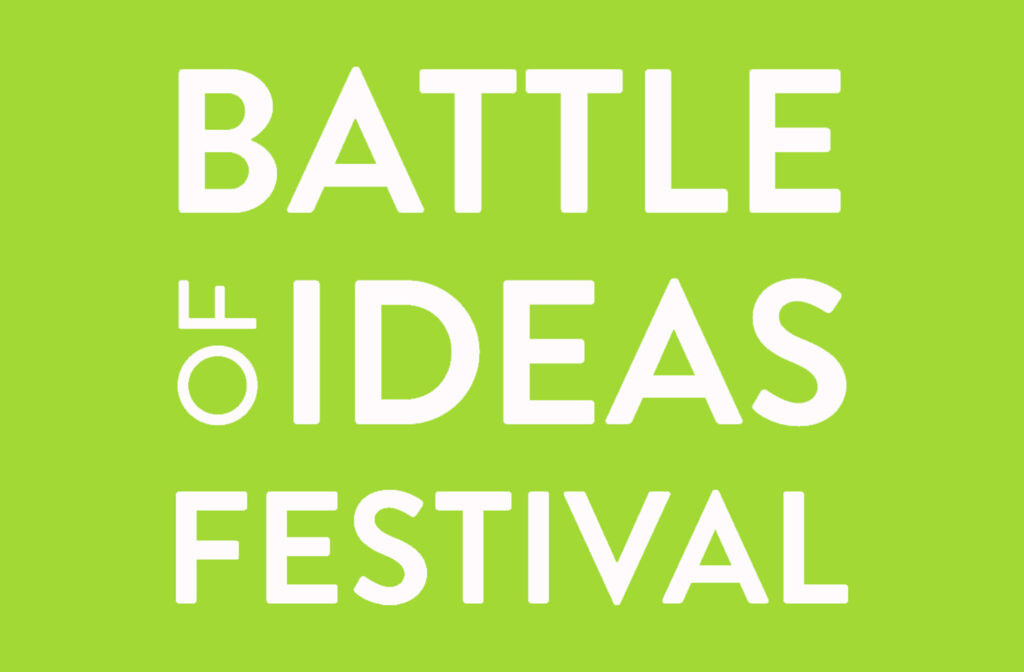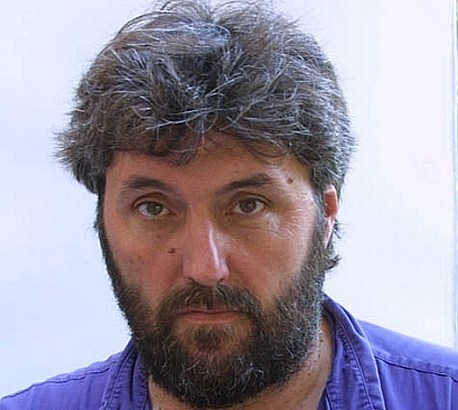
This year’s Battle of Ideas Festival includes a panel discussion on the future of political cartooning on Sunday 29th October. Titled “Breakfast Banter: Gagged Cartoonists: Is Satire Still Possible?” it follows the recent sacking of Steve Bell from The Guardian, who had worked for the newspaper for forty years, to the dismay of his fans. But the discussion was prompted by wider, international concerns about the future of political cartooning and the use of satire in the media.
In recent years, Guardian cartoonist Steve Bell’s long-running “If…” was cancelled, and his latest commentary on the recent sickening events in the Middle East, with thousands dead, led to his latest cartoon was “spiked”, and Steve was sacked, by email, by the ‘liberal’ newspaper, after contributing to its pages for forty years.
The cartoon, depicted Israeli Prime Minister Benjamin Netanyahu that critics said drew on antisemitic imagery. It is now posted on Steve’s official website and on the social media site, X, where information embedded in the cartoon notes it homages a Vietnam War-era cartoon by David Levine, depicting US President Lyndon B. Johnson pointing at a Vietnam-shaped scar.

In a statement, The Guardian, who seem to be unwilling to comment further, said a decision had been made not to renew Steve Bell’s contract.
“Steve Bell’s cartoons have been an important part of the Guardian over the past 40 years — we thank him and wish him all the best,” publisher Guardian News and Media said. The Press Gazette reported his contract runs until April next year, but he was told his cartoons would no longer be published with immediate effect.
Bell, whose first cartoon for The Guardian was published on 1st November 1983, told Press Gazette no explicit reason was given for his sacking, although he suspected it was due to “difference of opinion”.
As a contracted freelance contributor, Bell said, historically, he would send in his cartoons by the evening before they were due to run and would not submit them for editor approval beforehand. More recently, The Guardian has asked for cartoons to be submitted by 4.00pm and for cartoonists to describe the idea for their cartoons to editors before 10.30am.
Bell said he complained he could not work under such timelines, which would require him to start working at 2.00am, but “the powers that be are very incommunicative”, instead issuing “diktats”.
Talking to the Jewish Chronicle, he defended the image and decried accusations that he used anti-Semitic tropes. “The cartoon is specifically about Benjamin Netanyahu’s disastrous policy failure which has led directly to the hideous recent atrocities around Gaza,” he said, “and about his proposed response that he had announced, using his actual words addressing the citizens of Gaza.
“The Guardian has every right not to publish my cartoon if it so chooses, but it should not do so using entirely contrived and false reasons. All that does is inhibit discussion of a dreadful but important subject.”
The sacking has been widely condemned, by commentators across the political spectrum, welcomed by some, and drew bemusement in some international newspapers. It also led to Queens’ College Politics Society in Cambridge cancelling an event with Steve, over concerns that his attendance could “provoke protests”.
In an opinion piece for Jewish News, Dr Tim Benson, director of the Political Cartoon Gallery and an authority on political cartoons, said: “Bell is certainly not a friend of Israel, especially when you take into account his cartoons on the subject and his apparent slavish support for Jeremy Corbyn when Labour leader. However, this cartoon may have been anti-Israeli but it was definitely not antisemitic.
“… Political cartoons by their very nature are full of bias and subjectivity,” he addded. “They can be cruel and unfair but sometimes timing plays more of a part in people’s perception of them than anything else. This was very much the case here.”
Dr Benson felt the cartoon was, “in reality, no more critical than those appearing in The Times or the Independent. There were certainly no complaints about any of these.”
Writing in India Express, Indian political cartoonist EP Unny argued Bell has been no more of an offender than the best in the business.
In Prospect magazine, former Guardian editor Alan Rusbridger commented: “The career-ending depiction of Netanyahu by my old cartoonist Steve Bell raises many questions: was it antisemitic? Was it simply satirical? And has the right not to be offended trumped the right to offend?”
Noting how several cartoonists had, in the past, enraged their readers, among them David Low, possibly the greatest cartoonist of the 20th century, who was begged by no lesser figure than the then foreign secretary, Lord Halifax, to go easy on Adolf Hitler, Rusbridger observed: “Imagine having a job which involves deliberately causing offence. Imagine going to work to ridicule, belittle, savage and generally humiliate others. We would shun such bitter and twisted people, right?
“Not if they were cartoonists. Unless we were ourselves unlucky enough to be in their crosshairs, we might well laugh with them. We might enjoy the discomfort they cause. They might even succeed in reframing how we see a person or issue.
“On the other hand, we might be offended. We might think the joke fell flat, or that they had gone too far. We might consider a particular drawing tasteless in the extreme. The mockery might even conceivably push us to an extreme – even murderous – response.
“A cartoonist is, in other words, a tightrope walker.”
“At stake here is the British tradition of satire,” feels Fraser Nelson, writing in The Spectator. “Cartoonists exaggerate features and shock: ever since Gillray, we have been depicting and mocking world affairs through these cartoons. But the new enemy of this trend is Twitter, where non-readers of a publication take offence at a cartoon they don’t like.
Battle of Ideas asks: “Breakfast Banter: Gagged Cartoonists: Is Satire Still Possible?”
Ever since the days of William Hogarth and Edward Linley Sambourne, cartoonists have gleefully poked a disrespectful finger in the eye of the political establishment, using attention-grabbing drawings and incisive wit to expose pomposity, pretension and hypocrisy.
The power of cartoons to threaten the status quo has prompted repressive regimes to jail cartoonists – such as Atena Farghadani in Iran, Musa Kart in Turkey and Jiang Yefei in China. Yet in the proudly ‘liberal’ West, cartoons are increasingly being subject to censorship. Many creators have lost their livelihoods, or even their lives, for their work or views.
In addition to Steve Bell’s sacking, in recent times, fellow Guardian cartoonist Martin Rowson was praised for conceding and apologising for anti-Semitic motifs in one of his recent cartoons. Stella Perrett was fired from the Morning Star, after complaints that her cartoon about women’s single-sex spaces was ‘transphobic’. The cartoon was also reported to Avon & Somerset Police and recorded as a non-crime hate incident (NCHI), but Stella says the force will not confirm or deny the existence of the NCHI report. “I am faced with the situation where I cannot formally defend myself or clear my name,” she told Fair Cop, “because the police will not admit they hold the complaint against me, or reveal any of its details. For all I know, it will stay on my file for the rest of my life.”
Most tragically, Charlie Hebdo cartoonists were murdered in Paris, for offending radical Muslims.
Following a series of cartoon-related controversies, the New York Times stopped publishing daily political cartoons altogether, in favour of long-form visual journalism that expresses ‘nuance, complexity and strong voice from a diversity of viewpoints across all of our platforms’.
For the panel “Breakfast Banter: Gagged Cartoonists: Is Satire Still Possible?” at the Battle of Ideas, the panelists will discuss whether publishing political cartoons is simply too big a risk to take in the midst of a divisive culture war.
“What is the role of political cartoons today?” ask the organisers. “The Spectator’s Fraser Nelson argues that ‘cartoonists lampoon everyone and everything and have done for centuries’. But can a medium that thrives on caricature, exaggeration and righteous anger operate in a ‘be kind’ culture which shrinks from causing offence? Or are we seeing an overdue corrective that will encourage cartoonists to refocus their bile on targets that truly deserve it?”
Speakers at the event are Dr Graham Barnfield, consultant; founder, Emalone Books; former senior lecturer in journalism; Andy Davey, freelance cartoonist; and Stella Perrett, cartoonist, Radical Cartoons; author and illustrator, 2020, The Year We Were All Cancelled; women’s rights campaigner. The event will be chaired by Harley Richardson, chief product officer, OxEd and Assessment; organiser, AoI Education Forum; blogger, historyofeducation.net; author, The Liberating Power of Education.
• “Breakfast Banter: Gagged Cartoonists: Is Satire Still Possible?” 10.00am – 10.45 Sunday 29th October 2023, Council Room, Church House, Great Smith St, London SW1P 3AZ | Event Details here on the the Battle of Ideas web site
This year’s Battle of Ideas festivals are being held at Church House in Westminster on 28th and 29 October 2023 and Devonshire Dome in Buxton on 25th November. If you would like the organisers to keep you posted on all Battle of Ideas festival events, subscribe to their Substack
• Check out their YouTube channel and Soundcloud stream to enjoy recordings from past festivals
Further Reading
• AP News: The Guardian fires longtime cartoonist after allegations of antisemitic imagery
• Steve Bell explains how he was dropped from The Guardian on X, here
• Press Gazette: Steve Bell speaks out after being sacked by email following 40 years at Guardian
Bell stood by his controversial cartoon of the Israeli prime minister, saying: “I think it works.”
• Jewish News: Opnion – In sacking Steve Bell the Guardian shows it still doesn’t understand antisemitism
• Prospect: Can political cartoons survive in an age of sensitivity?
Opinion piece by former Guardian editor Alan Rusbridger
• India Express: E P Unny on Guardian sacking cartoonist: When the cartoon hurts more
The Guardian sacked its longtime staff cartoonist Steve Bell for his drawing of Benjamin Netanyahu. But he has been no more of an offender than the best in the business
• BNN: Cartoonist Steve Bell’s Controversial Departure from The Guardian: A Debate on Artistic Freedom
By Sheena Oberoi, 15th October 2023
• The Spectator: In Defence of Steve Bell, by Frase Nelson
• N+1: A Surge in Suppression
It’s never been this bad, says Dylan Saba whose Guardian commissioned opinion piece on a wave of retaliation and censorship of political expression was recently spiked by the paper
Creator Links
• Steve Bell is online at belltoons.co.uk
• Stella Perrett is online at Radical Cartoons | Uncancelled | Statement to Fair Cop
• Martin Rowson is online at martinrowson.com
The founder of downthetubes, which he established in 1998. John works as a comics and magazine editor, writer, and on promotional work for the Lakes International Comic Art Festival. He is currently editor of Star Trek Explorer, published by Titan – his third tour of duty on the title originally titled Star Trek Magazine.
Working in British comics publishing since the 1980s, his credits include editor of titles such as Doctor Who Magazine, Babylon 5 Magazine, and more. He also edited the comics anthology STRIP Magazine and edited several audio comics for ROK Comics. He has also edited several comic collections, including volumes of “Charley’s War” and “Dan Dare”.
He’s the writer of “Pilgrim: Secrets and Lies” for B7 Comics; “Crucible”, a creator-owned project with 2000AD artist Smuzz; and “Death Duty” and “Skow Dogs” with Dave Hailwood.
Categories: Comics, Creating Comics, downthetubes Comics News, downthetubes News, Events
 The SEQUENT’ULL Interviews: Dan White
The SEQUENT’ULL Interviews: Dan White  Angoulême International Comics Festival to celebrate Spanish comics in 2025
Angoulême International Comics Festival to celebrate Spanish comics in 2025  The SEQUENT’ULL Interviews: Michelle Freeman
The SEQUENT’ULL Interviews: Michelle Freeman  Call for Papers: Comics Forum 2024
Call for Papers: Comics Forum 2024